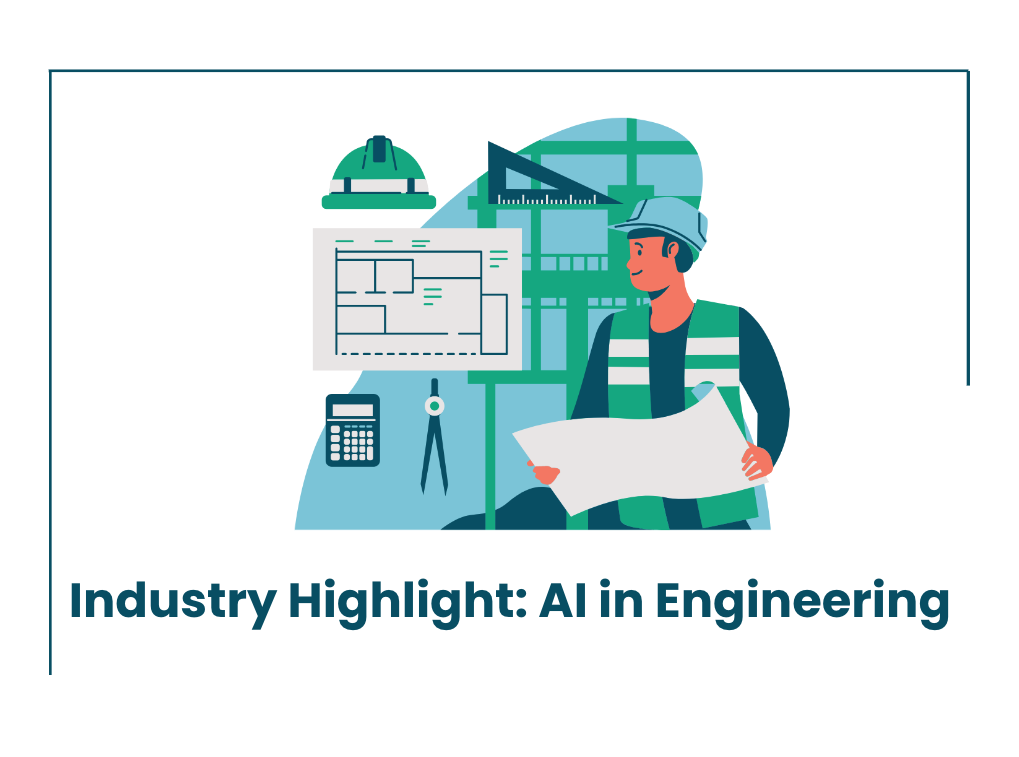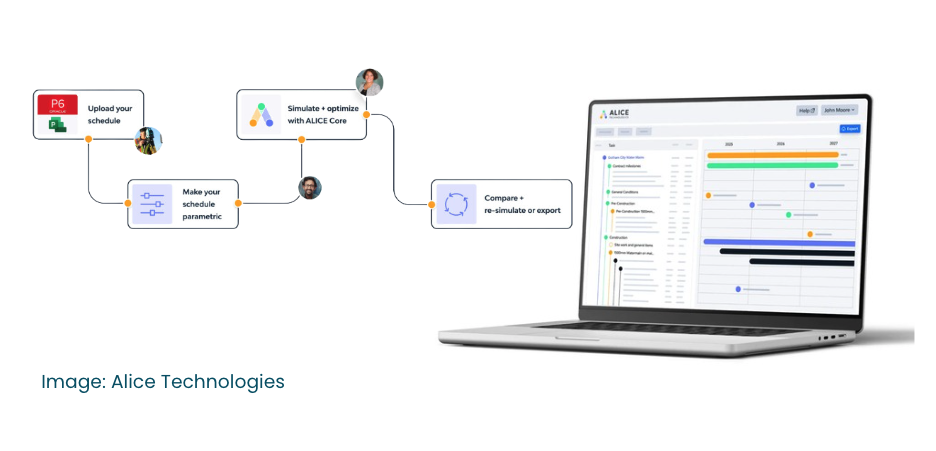
Contents

Artificial Intelligence is making a significant impact across various industries, and engineering is no exception. As a powerful tool, AI is not only optimizing business tasks but also reshaping core engineering activities. From automating routine processes to enabling data-driven decision-making, AI is helping engineering firms operate more efficiently and tackle complex challenges with precision.
Its impact extends throughout the organization, enhancing internal operations while driving innovation and sustaining competitive growth. By streamlining workflows and improving accuracy, AI frees up valuable resources, allowing engineers to focus on high-value tasks that drive business success.
This blog will explore specific use cases where AI is boosting capacity, productivity, and profitability in the engineering sector, demonstrating its transformative power in the field.

Application of AI for Business Tasks
Engineering firms often face significant administrative workloads, from managing documentation and project timelines to handling scheduling and data entry. These tasks, while essential, can be time-consuming and detract from core engineering activities and billable hours. By leveraging AI, firms can streamline internal operations and tackle these challenges more effectively.
This increased efficiency translates into higher profitability, as less time is spent on administrative duties and more resources are available for high-impact engineering work. Ultimately, AI not only frees up valuable time but also creates opportunities for growth and innovation, driving the business forward.
AI for Planning and Scheduling: AI-powered software is transforming how engineers approach project planning and scheduling, enabling teams to efficiently analyze plans from the start to ensure no detail is overlooked. By proactively addressing potential issues, these tools can save significant time that would otherwise be spent on manual adjustments later on.
Take Alice Core, for example. This AI-driven solution lets users upload project schedules to simulate different scenarios and find the most efficient schedule. It also helps engineers uncover any hidden problems or inefficiencies, giving you the chance to tackle them early. These cutting-edge planning and scheduling capabilities could slash labor costs by as much as 14%, driving significant savings and efficiency.

AI for Document Processing and Data Entry: AI has the potential to take the burden off engineering teams by automating tedious administrative tasks like data entry and document processing. A powerful example is Microsoft 365 Copilot, an AI tool that integrates directly into the Microsoft apps many people already use daily. With AI-driven assistance, tasks such as quick data entry, content summarization, and document generation can be handled efficiently, helping Engineering teams streamline workflows and improve real-time communication. By reducing manual errors and automating repetitive processes, 365 Copilot significantly boosts productivity and compliance.
The integration of Microsoft 365 Copilot is not as easy as you may think. Launching the software requires strategic vision, technical readiness, supported integration, and proactive planning. Thankfully, partnering with an experienced AI consultancy like Louder Co. can bridge the gaps and shed light on the most impactful opportunity areas. With our well-planned rollout and dedicated training, past clients have seen an estimated 25% increase in productivity! The time saved would enable engineering firms to dedicate more resources to high-impact activities that fuel growth and spark innovation.
AI for RFPs: Integrating AI into RFP systems will enhance the traditionally manual RFP process, turning it into a streamlined, automated workflow. With AI-powered RFP software like Loopio, engineering firms can tap into a centralized knowledge base that draws from past proposals, eliminating the need to start from scratch each time. These smart systems can also predict client needs, track project communications, and manage follow-ups, ensuring a more responsive and personalized approach. When implemented effectively, AI-driven RFP solutions can boost efficiency by up to 40% and potentially double win rates! This forward-thinking approach reduces administrative burdens, freeing up valuable resources to focus on core engineering activities.

Applications of AI for Engineering
AI is reshaping engineering workflows, elevating every aspect from design and analysis to quality control. By automating tedious tasks and providing actionable insights, AI empowers engineers to tackle more ambitious projects and focus on creative, high-impact solutions. Together, AI and engineers are driving projects forward with unmatched precision and efficiency, constantly expanding the horizons of what’s possible in engineering.
Predictive Maintenance and Monitoring: AI-based monitoring systems are changing the approach to equipment maintenance by predicting failures and identifying needs before issues arise. By analyzing sensor data, such as temperature, vibration, and usage patterns, AI anticipates wear and tear, allowing teams to schedule maintenance proactively. AI-driven tools like Augury will minimize downtime and extend the lifespan of critical equipment. Predictive maintenance programs use machine learning algorithms to optimize maintenance schedules and catch potential problems early.
Beyond keeping machines running smoothly, AI-powered predictive maintenance and simulations reduce material waste, prevent costly mistakes, and ensure efficient resource use. AI-driven analysis also identifies risks and ensures compliance with safety standards, creating a safer and more reliable work environment. With AI, engineering teams can maintain peak performance and focus on innovation, rather than reacting to unexpected failures.
Structural Analysis and Safety Assessments: AI is enhancing structural design analysis by helping engineers detect potential flaws and identify areas for improvement with greater accuracy. While Finite Element Method (FEM) software has long been a cornerstone in engineering, advancements in computing power have made it possible to analyze complex 3D models more quickly than ever before. Integrating AI and machine learning algorithms into this process addresses two key concerns in structural engineering: reducing errors and optimizing designs. These technologies help minimize the risk of mistakes that could lead to structural failures or expensive redesigns, while also improving the precision of calculations.
AI not only boosts the reliability and accuracy of design analysis but also accelerates the entire process. Faster design and analysis cycles free engineers to focus on developing innovative solutions rather than spending time on repetitive tasks. This combination of speed and precision enables engineering teams to push boundaries and deliver safer, more efficient designs.
Computer-Aided Design (CAD): Once reliant on human expertise and manual labor, CAD processes are undergoing a huge shift, thanks to the integration of AI. With AI-powered generative design tools, engineers can explore multiple design iterations automatically generated based on specific requirements and previous preferences, making it easier to draft drawings. This approach allows for rapid design optimization while enhancing performance and decreasing user error.
For engineers collaborating with design professionals and stakeholders, AI-driven tools make it possible to easily collaborate on models and suggest improvements in real-time. Cloud-based CAD software like Onshape enables real-time collaboration by allowing multiple users to access and edit designs simultaneously, accelerating product development and reducing misunderstandings. AI’s ability to continually adapt and refine models ensures that designs not only meet but exceed standards, giving engineers a competitive edge.

Adopting AI is essential for engineering firms to stay ahead and outpace their competitors. Mastering the AI journey and implementing the right tools can unlock powerful benefits like significant time savings, cost reductions, enhanced accuracy, and smarter decision-making. We recently launched an engineering client’s AI journey with a dynamic start by creating their AI strategic roadmap and a cutting-edge innovation committee playbook.
At Louder Co., we adopt a holistic approach to AI education, AI strategy, and AI execution, ensuring your business not only maximizes ROI but also successfully achieves its goals. If you're prepared to embark on your AI journey, contact us today! Together, we can transform the complexities of operational success into opportunities for growth and prosperity.


